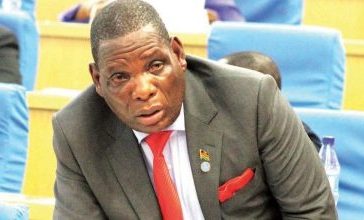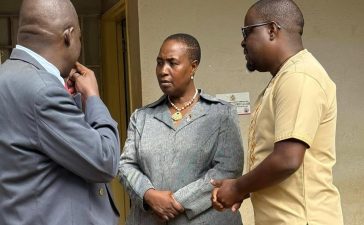𝐓𝐄𝐍 𝐅𝐀𝐂𝐓𝐒 𝐀𝐁𝐎𝐔𝐓 𝐓𝐇𝐄 𝐌𝐀𝐋𝐀𝐖𝐈 𝐂𝐎𝐍𝐆𝐑𝐄𝐒𝐒 𝐏𝐀𝐑𝐓𝐘
By Mariana Nkhoma
𝟏. 𝐓𝐡𝐞 𝐅𝐨𝐮𝐧𝐝𝐢𝐧𝐠 𝐀𝐫𝐜𝐡𝐢𝐭𝐞𝐜𝐭𝐬 𝐨𝐟 𝐚 𝐍𝐚𝐭𝐢𝐨𝐧
The Malawi Congress Party (MCP) is the cornerstone of our national identity. It shattered the chains of colonial subjugation and led Malawi from Nyasaland into proud sovereignty. Under the visionary Ngwazi Dr. Hastings Kamuzu Banda, Malawi gained not just independence—but nationhood, a flag, a name, and a currency.
𝟐. 𝐁𝐮𝐢𝐥𝐝𝐞𝐫𝐬 𝐨𝐟 𝐌𝐨𝐝𝐞𝐫𝐧 𝐌𝐚𝐥𝐚𝐰𝐢
Eighty percent of the nation’s enduring infrastructure—hospitals, highways, universities, civic centres—are the legacy of MCP’s developmental foresight. What followed was regrettably an era of retrogression.
𝟑. 𝐀 𝐍𝐚𝐭𝐢𝐨𝐧𝐚𝐥 𝐏𝐚𝐫𝐭𝐲, 𝐑𝐨𝐨𝐭𝐞𝐝 𝐢𝐧 𝐄𝐯𝐞𝐫𝐲 𝐕𝐢𝐥𝐥𝐚𝐠𝐞
Unlike fleeting, factional movements, MCP boasts the only party structure firmly anchored from grassroots to national levels. The only party with structures at every level, a truly living institution of national unity.
𝟒. 𝐂𝐡𝐚𝐦𝐩𝐢𝐨𝐧𝐬 𝐨𝐟 𝐈𝐧𝐝𝐮𝐬𝐭𝐫𝐢𝐚𝐥 𝐀𝐦𝐛𝐢𝐭𝐢𝐨𝐧
MCP laid the foundation of Malawi’s once-thriving industrial base—manufacturing, textiles, and agro-processing. Successive regimes abandoned this legacy, presiding instead over deindustrialization, disinvestment and economic sabotage through corruption.
𝟓. 𝐋𝐞𝐚𝐝𝐞𝐫𝐬𝐡𝐢𝐩 𝐁𝐞𝐲𝐨𝐧𝐝 𝐋𝐢𝐧𝐞𝐚𝐠𝐞
MCP’s leadership has always emerged through national consensus, not hereditary succession. It is a party of principle, not privilege—a far cry from political dynasties masquerading as democratic movements.
𝟔. 𝐍𝐚𝐭𝐢𝐨𝐧-𝐁𝐮𝐢𝐥𝐝𝐢𝐧𝐠 𝐓𝐡𝐫𝐨𝐮𝐠𝐡 𝐘𝐨𝐮𝐭𝐡 𝐄𝐦𝐩𝐨𝐰𝐞𝐫𝐦𝐞𝐧𝐭
From Youth Week infrastructure to skills training and agricultural exchange programmes, MCP has always invested in young people as agents of national development—then and now.
𝟕. 𝐒𝐭𝐞𝐰𝐚𝐫𝐝𝐬 𝐨𝐟 𝐍𝐚𝐭𝐢𝐨𝐧𝐚𝐥 𝐒𝐩𝐨𝐫𝐭𝐢𝐧𝐠 𝐏𝐫𝐢𝐝𝐞
Under MCP’s stewardship, Malawi lifted regional football trophies—winning the CECAFA Cup in 1978, 1979 and 1988 and nurtured sports talent through structured policy. Subsequent regimes allowed that flame to flicker.
𝟖. 𝐑𝐞𝐬𝐩𝐞𝐜𝐭𝐞𝐫𝐬 𝐨𝐟 𝐃𝐞𝐦𝐨𝐜𝐫𝐚𝐭𝐢𝐜 𝐖𝐢𝐥𝐥
When change beckoned in 1994, MCP, under Kamuzu Banda, accepted electoral defeat with dignity—setting a gold standard for democratic transitions in Africa.
𝟗. 𝐏𝐢𝐥𝐥𝐚𝐫𝐬 𝐨𝐟 𝐍𝐚𝐭𝐢𝐨𝐧𝐚𝐥 𝐔𝐧𝐢𝐭𝐲
MCP governs with a national lens—not through the prism of tribe or region. Its inclusive ethos gave birth to the Tonse Alliance, a broad coalition for unity and shared development.
𝟏𝟎. 𝐓𝐡𝐞 𝐁𝐥𝐮𝐞𝐩𝐫𝐢𝐧𝐭 𝐟𝐨𝐫 𝐒𝐮𝐬𝐭𝐚𝐢𝐧𝐚𝐛𝐥𝐞 𝐏𝐫𝐨𝐠𝐫𝐞𝐬𝐬
MCP does not rule for expedience. It governs with discipline, integrity, and vision. Today, it is once again restoring what was lost—rebuilding roads, restoring fiscal discipline, and laying a firm foundation for Malawi’s future.













